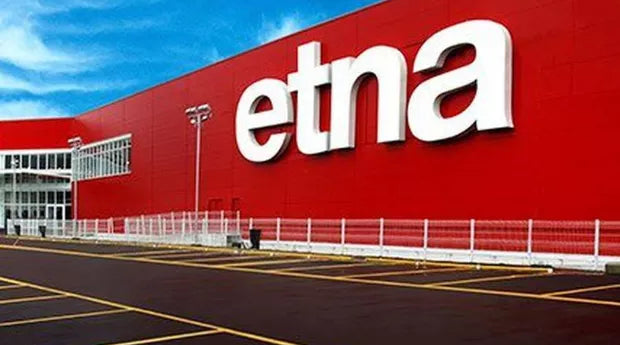Etna sells off stock to close operations after years of difficulties; analysts say it failed to invest in online and update stores.

The furniture and decoration retail chain Etna announced a few days ago that it would be closing its doors with a mega sale and discounts of up to 90% to clear all of its stock. The decision marks the beginning of the end of a long period of crisis for the retailer, which had been closing stores for several years. For those who observe the sector, the move helps to understand the trends that have guided the furniture and decoration retail sector in recent years and that will influence its future.
The closure of activities coincides with a peculiar moment for the sector. Stuck at home, people have spent the last few years thinking about and investing in decoration, which has boosted the sector. The market boom, however, was not enough to compensate for some strategic errors that left Etna behind.
Founded in 2004, Etna was born with the ambition of becoming the largest specialized furniture and decoration retailer in the country, competing directly with Tok&Stok. The company had 18 stores in 2015, but has been closing units for years – today there are only four stores left, three in the state of São Paulo and one in Brasília.
Despite its ambition, Etna never became a fully mature operation. Struggling to generate results, the company suffered from the economic crisis of 2015 and was unable to recover. There have been many attempts to sell or merge the company since then, all of which have been unsuccessful.
The chain belongs to the Kaufman family, the same family that owns the jewelry retailer Vivara, which is profitable and growing. Analysts also point to competition for attention from its wealthy sister as a challenge for Etna. When faced with the choice of focusing on a profitable and growing business or one that needed more investment to thrive, the Kaufmans chose the former. Vivara went public in 2019 and is now worth R$6.6 billion on the stock exchange.
“There was a need to pay attention to business. When it was necessary to decide where to allocate resources to grow and generate value, Vivara’s thesis was much more attractive,” says Alberto Serrentino, founder of the consultancy firm Varese Retail.
Stopped in time?
In this context, Etna ended up somewhat stuck in time. The chain is based on the megastores model, with large, expensive and tiresome units for the consumer. It is a model inspired by the giant Ikea, but it has lost ground in recent years. The supermarket sector has experienced a similar movement: hypermarkets have lost ground, while wholesalers have advanced with competitive prices, and local stores have solved the consumer's problem with last-minute purchases.
Tok&Stok has followed this trend and has been investing in smaller stores in shopping malls for some years now. However, Etna has maintained its standard store model, regardless of the location. “Etna has maintained a megastore model that forces customers to walk around the entire store. Consumers no longer have that option,” says Jéssica Costa, partner at AGR Consultores.
Another trend that Etna has not followed is online shopping. Etna did not invest as much as it should have in digital, and suffered a major setback with the pandemic. The growth of online shopping in the last two years has boosted digitally native companies that were already gaining ground in the segment, such as MadeiraMadeira and Mobly.
At the beginning of last year, MadeiraMadeira received an investment of 190 million dollars led by SoftBank and Dynamo and was valued at more than 1 billion dollars. Today, it has more than 100 physical stores spread throughout the country. Mobly raised 812 million reais in its IPO also in 2021. Capitalized and with investments in tools such as data intelligence to boost sales, they have been taking over the space previously occupied by Etna.
In addition to the convenience of online shopping, companies that were born on the internet sell consumers a product curation service that Etna has not embraced either. “It’s a model similar to that of the fashion market, where the relationship is not just transactional,” says Alexandre Machado, retail and consumer director at the consulting firm Bip.
This trend brings about new behavior on the part of customers. If before they bought home items thinking they would keep that product for the next 10 or 15 years, now changing the decor or furniture arrangement is becoming more common. It is a trend that demands even more agility and intelligence from the players involved.

